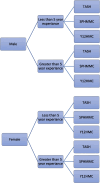Physicians' perception towards continuing professional development in government teaching hospitals of Addis Ababa, Ethiopia-mixed method design
- PMID: 39833785
- PMCID: PMC11748240
- DOI: 10.1186/s12913-025-12261-3
Physicians' perception towards continuing professional development in government teaching hospitals of Addis Ababa, Ethiopia-mixed method design
Abstract
Background: Continuing professional development has been mandatory for healthcare professionals to renew their licenses. However, there is a shortage of information regarding physicians' perceptions of continuing professional development. Therefore, it is timely to assess the perception of physicians and barriers toward continuing professional development.
Methods: An institution-based quantitative design triangulated with a qualitative research design was conducted. A total of 367 and 6 study participants were included in the quantitative and qualitative study, respectively. Simple random and purposive sampling strategies were employed to select participants for the quantitative and qualitative parts. Quantitative Data was inserted in EPI-INFO version 7 and cleaned and analyzed using the Statistical Package for the Social Sciences,version 25 statistical program. Binary-dependent categorical variables were analyzed using binary logistic regression. Multiple logistic regression analysis was assessed to observe the association between perception and various explanatory variables. Thematic content analysis was conducted to develop items from transcribed qualitative information.
Result: This study involved 367 participants from three government teaching hospitals in Addis Ababa, Ethiopia. Being younger (20-30) had significantly higher odds of positively perceiving continuing professional development. It also showed that the department of healthcare Professionals had a statistically significant association with the perception of continuing professional development. Those working in Internal Medicine and Obstetrics and Gynecology departments and healthcare professionals had significantly higher odds of perceiving continuing professional development as good. The interviews revealed that the barriers to continuing professional development are divided into Individual and health system barriers. The Individual barriers include awareness gap, Motivation Issues and Family size, whereas the health system-related barriers include recognition, infrastructure, time, place, and accessibility. CONCLUSION AND RECOMMENDATION: The study identified the department of the healthcare professional as significantly associated with perception of continuing professional development. Improving patient care collaboration and career progression influenced physicians' perception of continuing professional development. The study findings suggest the need for effective strategies to enhance physicians' engagement in continuing professional development and improve the quality of healthcare services in Ethiopia.
Keywords: Continuing Professional Development; Perception; Physicians.
© 2025. The Author(s).
Conflict of interest statement
Declarations. Ethics approval and consent to participate: The research was conducted after ethics approval from the Institutional Review Board of Addis Continental Institute of Public Health. All methods were carried out in accordance with relevant guidelines and regulations. Informed consent, in written form, was obtained before physician data collection. Consent for publication: Not applicable. Competing interests: The authors declare no competing interests.
Figures
Similar articles
-
Practice of code of ethics and associated factors among medical doctors in Addis Ababa, Ethiopia.PLoS One. 2018 Aug 8;13(8):e0201020. doi: 10.1371/journal.pone.0201020. eCollection 2018. PLoS One. 2018. PMID: 30089133 Free PMC article.
-
Medical doctors profile in Ethiopia: production, attrition and retention. In memory of 100-years Ethiopian modern medicine & the new Ethiopian millennium.Ethiop Med J. 2008 Jan;46 Suppl 1:1-77. Ethiop Med J. 2008. PMID: 18709707
-
Process evaluation of quality of precancerous cervical lesion screening program in selected public health centers in Addis Ababa, Ethiopia.J Cancer Policy. 2025 Mar;43:100557. doi: 10.1016/j.jcpo.2025.100557. Epub 2025 Jan 9. J Cancer Policy. 2025. PMID: 39793927
-
Inter-professional collaboration and associated factors among nurses and physicians in specialized public hospitals, the northwest, Ethiopia: mixed method multi-centered cross-sectional study.BMC Health Serv Res. 2023 Mar 27;23(1):286. doi: 10.1186/s12913-023-09200-5. BMC Health Serv Res. 2023. PMID: 36973734 Free PMC article.
-
[Psychometric characteristics of questionnaires designed to assess the knowledge, perceptions and practices of health care professionals with regards to alcoholic patients].Encephale. 2004 Sep-Oct;30(5):437-46. doi: 10.1016/s0013-7006(04)95458-9. Encephale. 2004. PMID: 15627048 Review. French.
References
-
- Information for registrants. Continuing professional development and your registration - PDF Free Download. Available from: https://docplayer.net/399717-Information-for-registrants-continuing-prof.... Cited 2022 Sep 14.
-
- Investigating EFL Teachers’ Perspectives on the Importance and Barriers of Professional Development. HLT Magazine. 2018. https://www.hltmag.co.uk/apr18/page/?title=Investigating+EFL+Teachers%26.... Accessed 30 Oct 2018.
-
- Zeinab S, Khalil M. Investigating EFL Teachers' Perspectives on the Importance and Barriers of Professional Development. Humanizing Lang Teach. 2018;Issue 2.
-
- Marsha S, Caroll Knipe. Why can’t we get it right? Corwin. 2022. Available from: https://us.corwin.com/en-us/nam/book/why-cant-we-get-it-right-0. Cited 2022 Aug 29.
-
- Continuing Professional Development For Clinical Psychologists: A Practical Handbook [PDF] [25vn1vd5a9k0] Available from: https://vdoc.pub/documents/continuing-professional-development-for-clini.... Cited 2022 Aug 29.
MeSH terms
LinkOut - more resources
Full Text Sources
Miscellaneous


